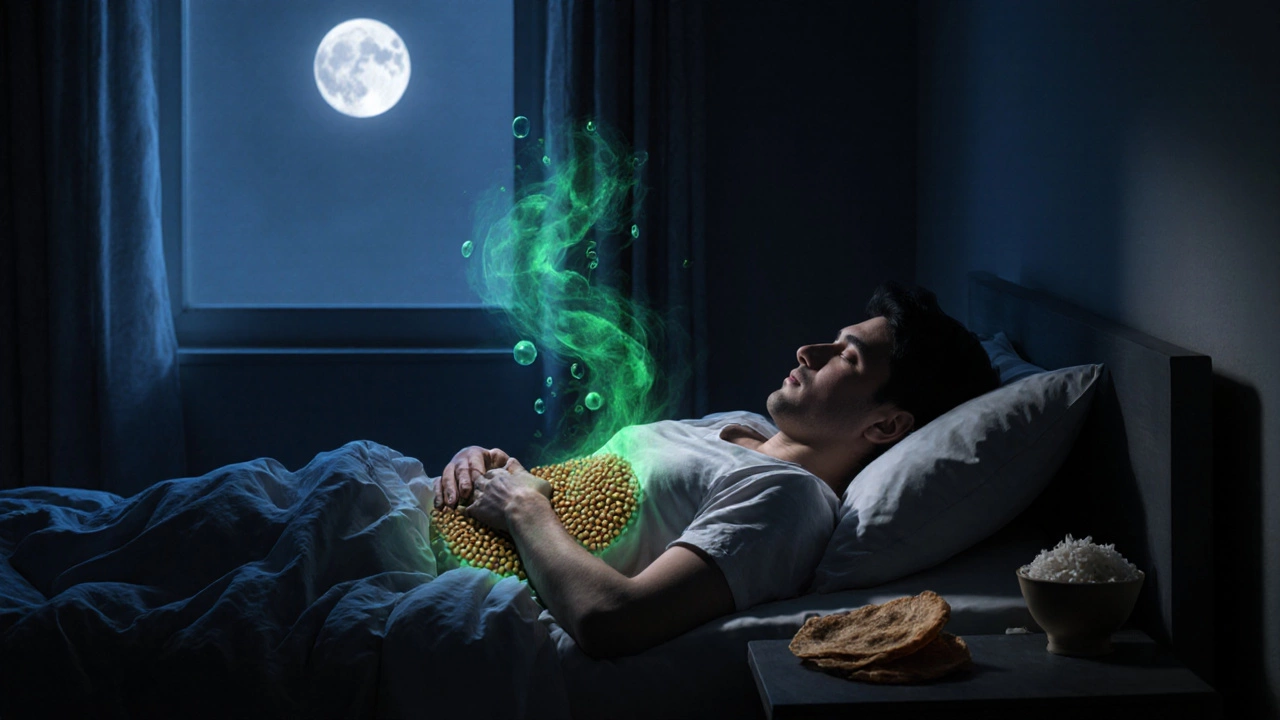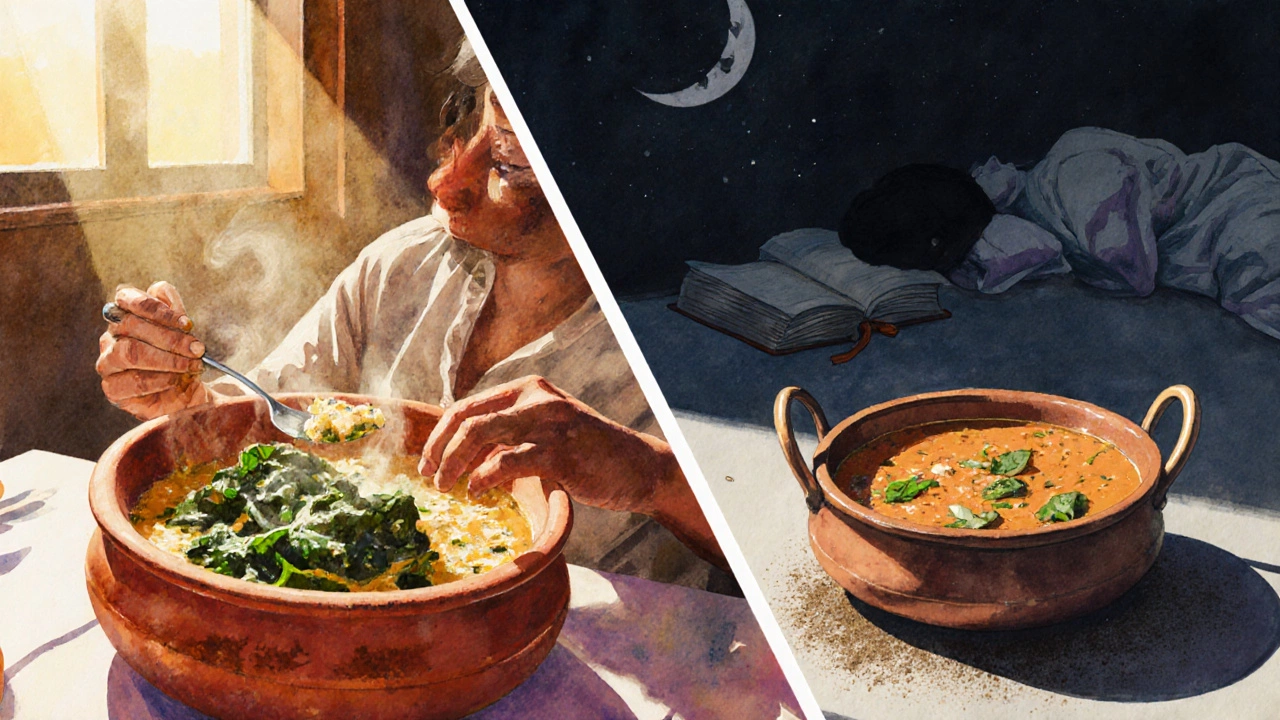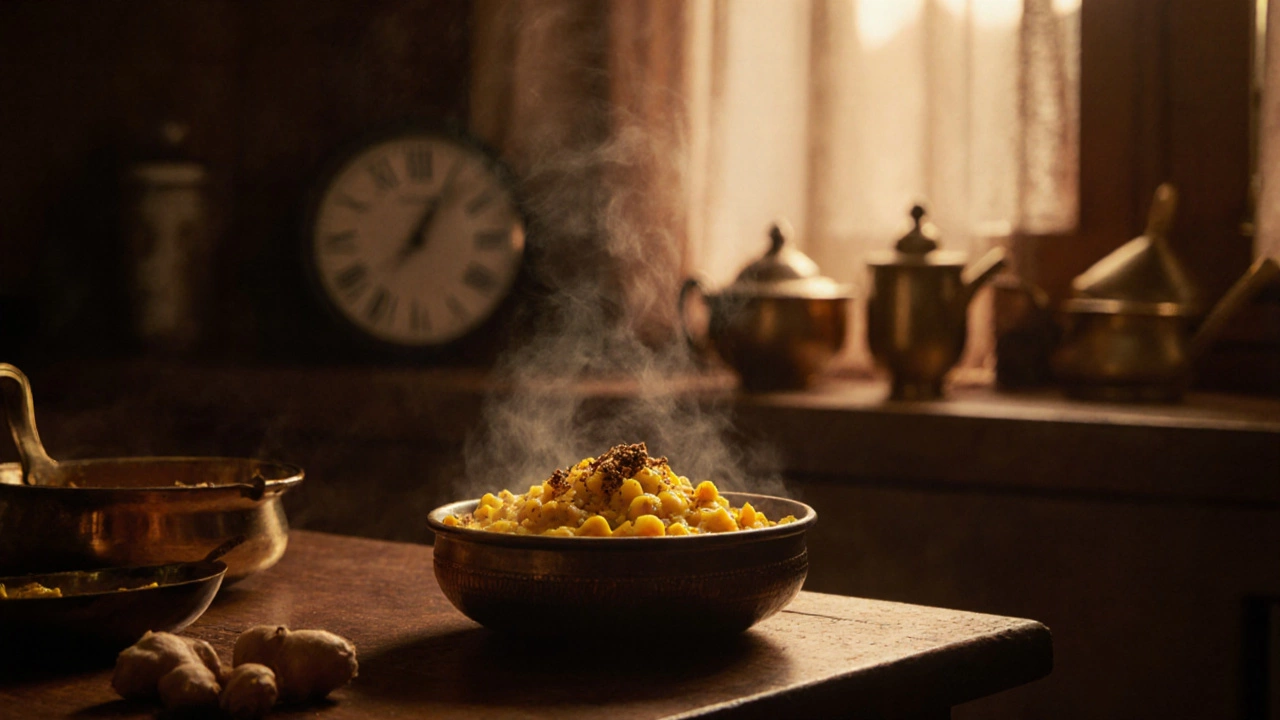Dal Timing Calculator
Dal Consumption Calculator
Results
You've selected an optimal time for dal consumption.
Your digestive system has sufficient time to process the dal before sleep. This timing minimizes bloating, acid reflux, and sleep disruption.
Ever sat down to a warm bowl of dal after a long day, only to lie awake later wondering why your stomach feels like it’s working overtime? You’re not alone. Many people in India and beyond have been told not to eat dal at night-but why? It’s not just an old wives’ tale. There’s real science behind it, and it’s tied to how your body handles food when it’s winding down.
Dal Is High in Protein and Fiber
Dal-whether it’s masoor, toor, chana, or moong-is packed with plant-based protein and fiber. That’s great for lunch, when your body has hours to break it down. But at night, your digestive system slows down. Your metabolism drops, stomach acid production decreases, and gut motility slows. When you eat a heavy, fibrous food like dal right before bed, your body doesn’t have the energy or the time to process it properly.
Think of it like this: your gut is like a dishwasher. During the day, it’s running on full power. At night, it’s on standby. Dumping a pile of sticky, fibrous lentils into a dishwasher that’s barely humming? It’s going to leave residue-and that residue feels like bloating, gas, and discomfort.
Delayed Digestion Leads to Acid Reflux
Lentils contain oligosaccharides, a type of carbohydrate that humans can’t fully digest. Instead, gut bacteria ferment them, producing gas. That’s normal during the day. But at night, lying flat makes it easier for stomach acid to creep up into your esophagus. Add the gas pressure from fermenting dal, and you’ve got a recipe for heartburn or acid reflux.
A 2023 study in the Journal of Gastroenterology and Nutrition found that people who ate legumes within three hours of bedtime were 47% more likely to report nighttime heartburn compared to those who ate them earlier. It’s not about the dal itself-it’s about timing. The same lentils that give you energy at lunch can sabotage your sleep at midnight.
It Disrupts Sleep Quality
Ever wake up at 2 a.m. feeling bloated, gassy, or just… uncomfortable? That’s not just bad luck. Your body is still working to digest food. When your digestive system is active, it pulls blood flow away from other systems-including those that regulate sleep. Melatonin production drops. You toss and turn. You don’t reach deep REM sleep.
People who regularly eat heavy meals at night-even healthy ones like dal-tend to report poorer sleep quality, according to data from the Australian Sleep Health Foundation. You might fall asleep fine, but your sleep is fragmented. You wake up tired, even after eight hours.

Not All Dals Are the Same
Some dals are easier on the system than others. Moong dal, especially when peeled and well-cooked, is the lightest option. It’s lower in fiber and fermentable carbs. In traditional Ayurveda, moong dal is even recommended for evening meals in small portions. But chana dal or urad dal? Those are heavier. They take longer to cook, digest, and break down.
If you’re craving dal at night, go for a small bowl of well-simmered yellow moong dal with a pinch of cumin and ginger. Skip the ghee overload. Skip the fried toppings. Don’t pair it with rice or roti-just eat it plain. That’s the closest you’ll get to a safe nighttime dal.
What About Traditional Practices?
In many Indian households, dal is served for dinner. So why the conflict? Culture doesn’t always align with biology. Generations ate dal at night because food was simpler, portions were smaller, and people were more active. Farming, walking miles to water sources, manual labor-these kept metabolism high. Today, most of us sit at desks, scroll on phones, and then lie down.
Also, many traditional meals included dal with buttermilk, yogurt, or light vegetables-not heavy rice or fried papad. Modern versions? Often loaded with oil, garlic, and spices that add to the burden.
When Is the Best Time to Eat Dal?
If you want to get the full benefit of dal without the side effects, eat it between 5 p.m. and 7 p.m. That gives your body at least two to three hours to digest before sleep. It’s also the ideal window to absorb its nutrients-iron, folate, magnesium-without interference from your body’s nighttime slowdown.
Try this: make a light dal with turmeric, cumin, and a touch of ginger. Serve it with a side of steamed spinach or a small salad. No rice. No bread. Just dal and greens. Eat it while sitting upright. Don’t lie down for at least 90 minutes after.

What If You Really Crave It?
Cravings don’t disappear just because of rules. If you absolutely need dal at night, here’s how to minimize the damage:
- Use moong dal only-peeled and split, not whole.
- Cook it until it’s completely soft, almost mushy. The longer you cook, the easier it is to digest.
- Use minimal oil-no more than half a teaspoon.
- Add digestive aids: a pinch of asafoetida (hing), ginger, or ajwain.
- Keep the portion small-half a cup max.
- Wait at least two hours before lying down.
- Drink warm water or fennel tea afterward, not cold drinks.
And if you still feel bloated? That’s your body telling you it’s not the right time. Listen to it.
Alternatives to Dal for Evening Meals
You don’t have to give up protein at night. Just switch to lighter options:
- Steamed paneer cubes with lemon and black pepper
- Soft-boiled eggs with a sprinkle of chaat masala
- Low-fat yogurt with cucumber and roasted cumin
- Light vegetable soup with barley or quinoa
- Grilled tofu with garlic and coriander
These options give you protein without the fiber overload. They’re easier on your gut and won’t keep you awake.
Final Thought: It’s Not About Fear, It’s About Timing
Dal isn’t bad. It’s one of the most nutritious foods you can eat. But food isn’t just about what you eat-it’s about when, how much, and how you eat it. Eating dal at night isn’t a sin. It’s just inefficient. Your body isn’t built to digest heavy plant proteins while it’s trying to repair, reset, and rest.
If you want better sleep, less bloating, and more energy in the morning, adjust your timing. Eat dal at lunch. Keep your dinner light. Your stomach-and your sleep-will thank you.
Is it true that eating dal at night causes weight gain?
Not directly. Dal itself isn’t high in calories. But eating it late at night can lead to weight gain because your body doesn’t burn off the energy as efficiently. When digestion slows, unused calories are more likely to be stored as fat. Plus, bloating from poor digestion can make you feel heavier and less motivated to move the next day.
Can I eat dal if I have IBS?
Most people with IBS are advised to avoid lentils, especially at night. Dal contains FODMAPs-fermentable carbs that trigger bloating and cramps in sensitive guts. If you have IBS, stick to small portions of well-cooked moong dal during the day and avoid it entirely in the evening. Always track your symptoms with a food journal.
Does soaking dal overnight help digest it better?
Yes. Soaking dal for 6-8 hours reduces phytic acid and oligosaccharides, which are hard to digest. After soaking, rinse well and cook thoroughly. This makes dal easier on the stomach, even if eaten later in the day. But soaking doesn’t make it safe to eat right before bed-it just reduces the risk of discomfort.
Why do some people say they eat dal at night without issues?
Everyone’s digestive system is different. Some people have faster metabolisms, more active lifestyles, or stronger gut bacteria. Others might eat tiny portions or pair it with digestive herbs. But just because someone doesn’t feel symptoms doesn’t mean their body isn’t working harder than it should. Long-term, late-night dal can still contribute to chronic bloating or acid reflux, even if it’s not obvious right away.
Should I avoid dal at night if I’m trying to lose weight?
Yes, if you’re serious about weight loss. Late-night eating-even healthy foods-slows fat burning. Your body shifts into storage mode after sunset. Dal is nutrient-dense, but it’s also energy-dense. Save it for your most active hours. Replace nighttime dal with a protein-rich, low-fiber snack like Greek yogurt or boiled eggs to support muscle repair without triggering fat storage.
